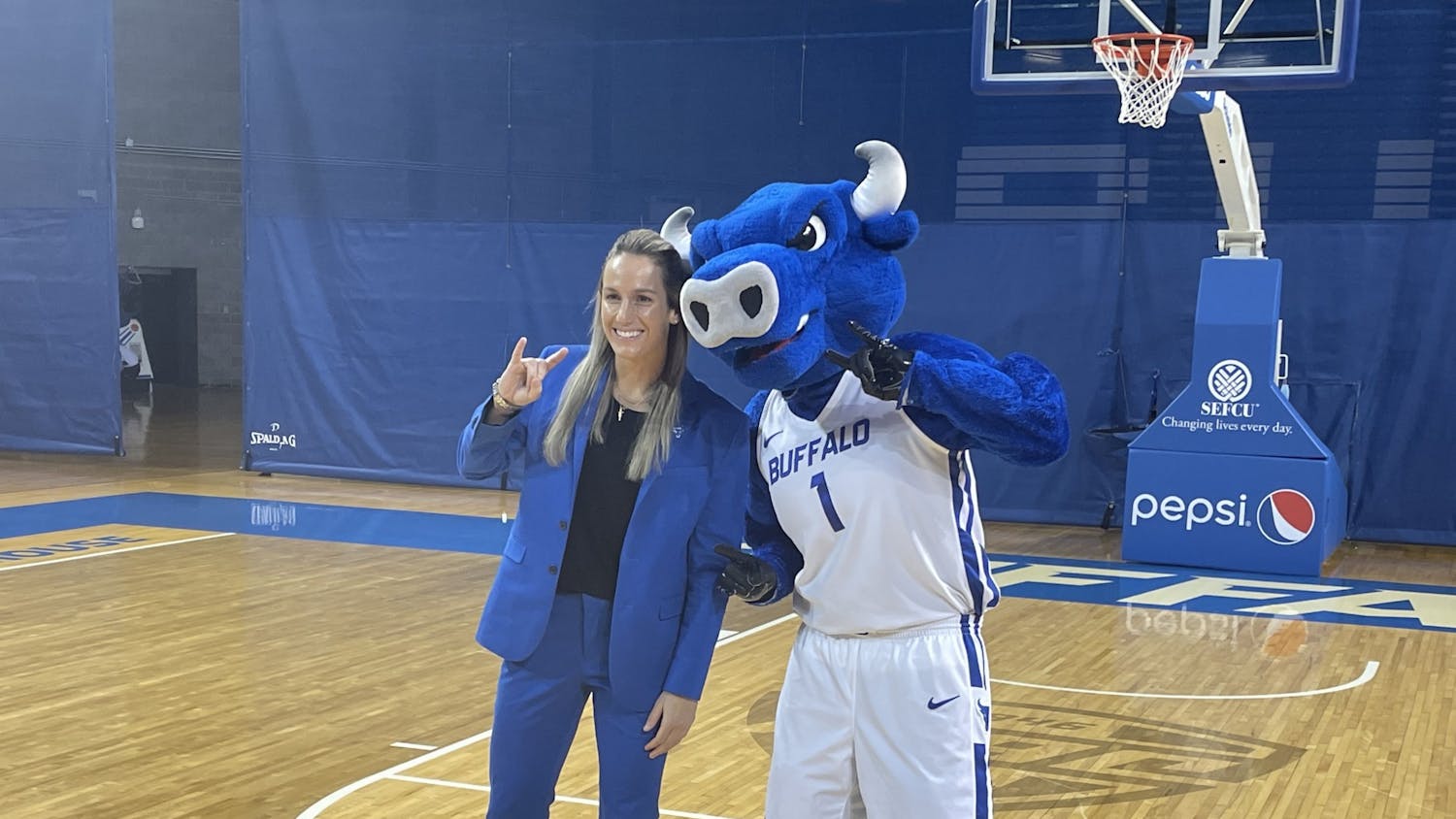Content warning: This article mentions sexual assault.
Whoever books guests for the Distinguished Speaker Series should give themselves a pat on the back, because this year’s was one for the books.
Actor Ken Jeong opened by cracking jokes between moments of emotional honesty. Former diplomat Marie Yovanovitch spoke candidly about patriotism and her time with the State Department. Former NAACP President Sherrilyn Ifill encouraged students to stand up for what’s right. And actress Selma Blair (alongside her adorable service dog, Scout) sealed the deal with her down-to-earth honesty.
But not every entry in the decades-old speaking series is memorable for the right reasons. The speaking circuit attracts more than its fair share of grifters, liars and abusers, and UB’s Distinguished Speaker Series is no exception. Today’s heroes are sometimes tomorrow’s villains.
So to celebrate the closing of a Distinguished Speaker Series that will (hopefully) age like a bottle of fine Chardonnay, let’s take a look back at just a few of the speeches that have aged like milk.
Kevin Spacey (2016):
Kevin Spacey was at the height of his fame when he addressed a packed Alumni Arena in 2016. He’d just starred as the machiavellian politician Frank Underwood in the fourth season of the hit Netflix show “House of Cards” and been nominated for two Emmys the year prior. He was on top of the world.
A mere 18 months later, the New Jersey native was unemployed and, in case you live under a rock, embroiled in allegations that he had sexually assaulted several young boys over the course of decades.
But Spacey’s sliminess doesn’t end there. The actor offered his first accuser an insincere if-I-did-it-style apology before coming out as gay in the same statement. I can only assume that was a cynical attempt to distract from the allegations, all while giving free ammunition to homophobic pundits who want to portray gay men as pedophiles.
But despite his complete unwillingness to take accountability, Spacey did fess up to one misdeed in his speech: As a struggling actor, Spacey told the audience that he had stolen a ticket to a film lecture from a sleeping woman.
“I know it was wrong,” Spacey said, according to UBNow. If only he’d repeated that line instead of denying the allegations against him in disturbing YouTube videos where he plays Frank Underwood.
Bill Cosby (2003):
Cosby seems to have spent much of his speech portraying himself as a committed husband and fun uncle, according to the UB Reporter. But of course, he had to slip in this “joke” about middle-aged parties: “We don’t have to worry about someone slipping ecstasy into our drinks — they might try to slip Viagra in there instead.”
The quip is as disgusting as his use of “we” is inappropriate.
Donald Trump (2004):
I tried to stay away from putting any politicians or government officials on this list. Sure, you could make convincing that Distinguished Speaker Series entries from George Bush Sr., Colin Powell, Hillary Clinton, Karl Rove, Joe Biden, Dick Cheney, Condoleeza Rice or Janet Reno have all aged poorly (or were ill-advised at the time), but on some level we expect politicians to get themselves into scandal, to be glib at best and downright dishonest at worst.
Besides, what really makes Trump’s speech memorable for all the wrong reasons isn’t his presidency, not really anyway. It’s the advice (or, as the UB Reporter puts it, “pearls of wisdom”) he offers to the presumably bright-eyed UB students in attendance: “Surround yourself with the best people and sort of trust them — not totally, but watch them,” the business mogul (and then-registered Democrat) said in his 40-minute speech. “If someone screws you, you screw them back.” “Be paranoid.” “The professors will be upset with this… [but] get even.”
And my personal favorite? “Always get a prenup. Had I not had a prenup, I would not be here!” (That being said, his use of the word “loser” to describe a building is a close second.)
Looking back on it from 2023, the speech is a forward and all-too-honest portrait of the man who would go on to be the 45th president of the U.S. Yes, he was always like this.
Steve Wozniak (2015):
For those of you who aren’t engineering majors, Wozniak co-founded Apple and helped lead the company until 1985. He’s a giant in computer science.
But since his 2015 speech, he’s added some less savory items to his resume. He founded his own private university, WozU, in 2017. An Arizona state oversight board had to review a formal complaint against the “institution,” according to azcentral.com, and one student told CBS that the school was effectively a “a $13,000 e-book.” Oh, and he has own cryptocurrency called WOZX.
Steven Levitt (2007):
Economist Levitt, alongside journalist Stephen Dubner, took the world by storm in the 2000s with their book, “Freakonomics,” which aims to expose the unexpected and unintuitive causes of everyday phenomena using economics.
And while perhaps the least problematic person on this list, Levitt has a lot to answer for intellectually.
Take his claim that the legalization of abortion in the ‘70s led to falling crime rates in the ‘90s because, simply put, unwanted children commit more crimes. It’s as fantastical as it is uncomfortable for folks across the political spectrum.
It’s also wrong. According to The Wall Street Journal, other economists found serious coding errors in their data and criticized the pair for counting arrests on a total (and not per capita) basis. When accounted for, the effect disappears.
But even if that wasn’t the case, saying that abortion was the main driver of this trend is still an irresponsible oversimplification of sociology. A lot of things changed between the ‘70s and ‘90s. Who’s to say GDP, having more women in the workplace, changing economic policies or some combination of thousands of factors weren’t confounding variables?
And it’s not just one theory. Levitt and Dubner have been objectively wrong about a long list of topics, including climate change.
I guess we should’ve taken Levitt’s opening line seriously: “I’m not a real economist.”
There’s clearly a lot to make fun of the Distinguished Speaker Series for. But before you get too carried away, just remember that UB only books speakers that they think people want to hear. After all, the first Distinguished Speaker to sell out Alumni Arena was recently suspended from practicing law in New York State for spreading election misinformation.
Grant Ashley is the managing editor and can be reached at grant.ashley@ubspectrum.com

Grant Ashley is the editor in chief of The Spectrum. He's also reported for NPR, WBFO, WIVB and The Buffalo News. He enjoys taking long bike rides, baking with his parents’ ingredients and recreating Bob Ross paintings in crayon. He can be found on the platform formerly known as Twitter at @Grantrashley.





